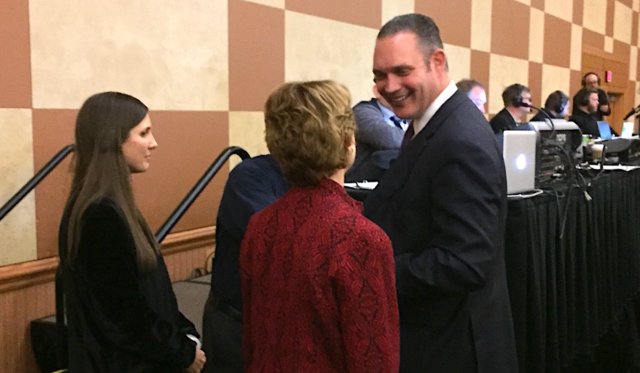

Senate Majority Leader Greg Treat (R-OKC) said he was going to have a theme at today’s Oklahoma State Chamber Public Affairs Forum, and he did.
“I’m going to continue to beat the dead horse: State Question 640 is the reason we’re in special session and the reason we haven’t been able to pass the cigarette tax,” Treat said. “We could have passed that easily if it was a 51-vote (measure). We wouldn’t be in special session if it weren’t for State Question 640 because we would have been able to pass a cigarette tax under the House and the Senate, but the 75 percent threshold has forced us to put revenue in there that we as Republicans may not be typically in favor of.”
Treat, House Speaker Charles McCall (R-Atoka), Senate Minority Leader John Sparks (D-Norman) and House Minority Leader-elect Steve Kouplen (D-Beggs) appeared in front of hundreds of State Chamber members at the Cox Convention Center. All four legislative leaders were asked about State Question 640, which many political insiders are discussing as an impediment to fixing Oklahoma’s budget problems after an unproductive 2017 legislative year.
“It’s worth revisiting. It’s worth discussing. But ultimately the people of Oklahoma passed that,” McCall said. “I think they are becoming very acutely aware that the Legislature has not enacted any new revenue at that threshold. I don’t think a lot of the people of Oklahoma know (about) that requirement.”
After Tuesday’s event, McCall said he would not be surprised if legislation is filed in 2018 that would ask Oklahoma voters whether to lower State Question 640’s threshold that revenue-raising measures pass each chamber with 75 percent of members voting “Yes.”
“Without a doubt if the requirement were lower — whether it was 60 percent, the level mandated for a local school district to pass a bond — would things be different at this point? Yes (…) no question,” McCall said.
After Tuesday’s event, Treat told NonDoc that a member of the Senate Republican Caucus will file a bill seeking to modify State Question 640’s three-fourths threshold.
“There is no official caucus position on the issue, but there is a bill in the works,” he said.
‘It has had the exact opposite effect’
The two Democrat leaders also noted interest in modifying State Question 640’s three-fourths threshold, but they proposed additional tweaks they would like to see on voting requirements.
“Should we adjust that? Probably,” Sparks said before noting he’d like there to be a higher requirement for raising fees on businesses. “We’ve had a landrun (on fees) on many people in this room. And that money is not going to improve the regulation of your businesses. Instead, it is being diverted to the general fund. So it is a tax on your businesses.”
Kouplen pitched an equal threshold for cutting taxes.
“They ought to institute the same percentage to cut a tax as it is to raise a tax,” he said. “It’s pretty ridiculous to think you can cut a tax with 51 votes, but it takes 76 votes to raise a tax in the House.”
Treat said while State Question 640 was intended to keep taxes low, he believes it has functionally resulted in more tax revenue being on the table because items must be packaged for a grand bargain.
“(State Question) 640 was designed to empower the minority. It was written by a lot of Republicans when we were in the minority,” Treat said. “(State Question) 640 was designed to keep taxes low. Indeed it has had the exact opposite effect when it comes to budget negotiations.”
He referenced the much-discussed cigarette tax.
“In order to get that, we have to agree to more taxes,” he said. “[State Question 640] makes business incentives much more of a target than if it did not exist.”




















